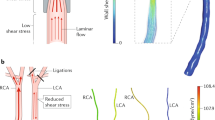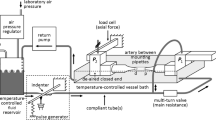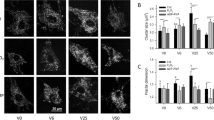Abstract
STRONG indirect evidence is now accumulating1,2 in support of the old idea that large mammalian arteries may be capable of contracting and relaxing at least as rapidly as the heart. Direct evidence based on studies of isolated arteries is still lacking, and this remains a major stumbling block in accepting the implications of much of the recent work.
This is a preview of subscription content, access via your institution
Access options
Subscribe to this journal
Receive 51 print issues and online access
$199.00 per year
only $3.90 per issue
Buy this article
- Purchase on Springer Link
- Instant access to full article PDF
Prices may be subject to local taxes which are calculated during checkout
Similar content being viewed by others
References
Wehn, P. S., Acta Physiol. Scand., 46, 107 (1959).
Heyman, F., Acta Med. Scand., 164, Supp. 344 (1959).
Paton, W. D. M., J. Physiol., 127, 40,P (1955).
Adrian, E. D., Bronk, D. W., and Phillips, G., J. Physiol., 74, 115 (1932).
Jungmann, H., and Rohr, H., Pflüg. Arch. ges. Physiol., 258, 38 (1953).
Author information
Authors and Affiliations
Rights and permissions
About this article
Cite this article
DICKINSON, C. Rapid Contractile Properties of Isolated Mammalian Arteries. Nature 185, 620–621 (1960). https://doi.org/10.1038/185620a0
Issue Date:
DOI: https://doi.org/10.1038/185620a0
Comments
By submitting a comment you agree to abide by our Terms and Community Guidelines. If you find something abusive or that does not comply with our terms or guidelines please flag it as inappropriate.



